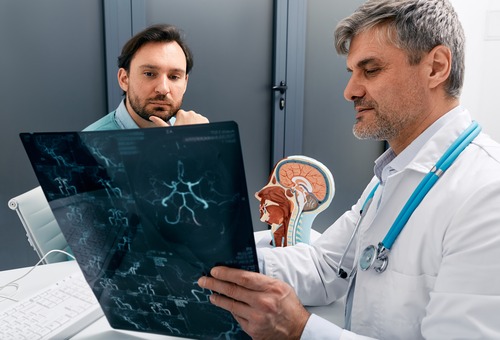At Georgia Spine & Orthopaedics, we focus on helping patients find real relief from pain and restore function. Our team includes specialists in neurology, orthopedics, spine care, and pain management, working together to treat a wide range of conditions affecting the nervous system, spine, and joints. Whether you’re dealing with chronic pain, nerve issues, spinal injuries, or orthopedic problems, we take the time to listen and create a personalized plan that works for you.
Wondering, “what is a neurologist and what do they do”? When something goes wrong with the brain, spinal cord, or peripheral nerves, it can lead to serious health problems. A neurologist is a medical doctor who specializes in diagnosing and treating neurological disorders, including seizure disorders, chronic pain, movement disorders, and memory problems.
In this blog, we explain what a neurologist does, the conditions they treat, common procedures, and when to see an experienced Atlanta neurologist at Georgia Spine & Orthopaedics for expert care.
What is a Neurologist and What Do They Do?
Neurologists are medical doctors who diagnose and treat disorders of the nervous system, including the brain, spinal cord, and peripheral nerves. They help patients manage neurological conditions, chronic pain, and severe nerve problems.
Diagnosing Neurological Disorders
Neurologists identify neurological disorders like Parkinson’s disease, multiple sclerosis, seizure disorders, and Alzheimer’s disease. They use neurological exams, nerve conduction studies, and CT scans to assess the central and peripheral nervous system.
Treating and Managing Conditions
Specialists in neurology create treatment plans that often include medications, rehabilitation therapies, and pain management. They work with orthopedic surgeons and other specialists when spinal cord surgery or additional care is needed.
Ongoing Care and Collaboration
Neurologists manage long-term neurological care, adjusting treatments as conditions like ALS or Parkinson’s disease progress. They collaborate with primary care doctors, pain specialists, and physical therapists to improve neurological function and quality of life.
Common Conditions Neurologists Treat
Specialists in neurology treat a wide range of neurological disorders that affect the brain, spinal cord, and peripheral nerves. These conditions often cause severe pain, movement issues, and changes in mental status.
Movement Disorders
Neurologists diagnose and manage movement disorders such as Parkinson’s disease, multiple sclerosis (MS), and amyotrophic lateral sclerosis (ALS). These disorders affect muscle control, balance, and coordination. Patients may experience unintentional jerks, tremors, or muscle weakness. Neurologists help reduce symptoms and improve function through medications and therapy.
Seizure and Nerve Disorders
Seizure disorders, including epilepsy, are a key focus for many specialists in neurology. They perform neurological exams and nerve conduction studies to identify abnormal brain activity. Peripheral nerve conditions, such as neuropathy, can cause chronic pain, numbness, and weakness. Treatment options may include medications, nerve blocks, or referral for spinal cord surgery if nerve compression is involved.
Cognitive and Memory Disorders
Neurologists treat neurological conditions that cause memory problems and changes in mental status, including Alzheimer’s disease and other dementias. They assess neurological function using physical exams and brain imaging, like computed tomography (CT) and magnetic resonance imaging (MRI). Early diagnosis helps patients and families plan for care.
Chronic Pain and Spinal Cord Issues
Many patients see neurologists for chronic pain linked to spinal cord injuries and nerve damage. Neurologists work with orthopedic surgeons and pain management specialists to address severe pain and explore treatment options, including surgical treatment when necessary. They help manage ongoing pain and improve daily living.
Balance and Coordination Problems
Balance problems and difficulty walking may result from brain and nervous system issues. Neurologists evaluate these symptoms to check for brain damage, nerve dysfunction, or spinal cord disorders. Treatment focuses on restoring movement and reducing fall risks.
Neurological Exams and Diagnostic Procedures
Neurologists use neurological exams and advanced tests to diagnose nervous system conditions that affect the brain, spinal cord, and peripheral nerves. These tools help identify the cause of neurological problems and guide treatment plans.
Neurological Exam
A neurological exam checks a patient’s mental status, reflexes, muscle strength, coordination, and balance. Neurologists assess neurological function by testing movement, sensation, and speech. This exam helps detect nerve damage, brain injuries, and spinal cord disorders.
Imaging Tests
Neurologists order imaging to see detailed pictures of the brain and spinal cord. Computed tomography (CT) and computer-assisted tomography (CAT) scans help identify brain damage, tumors, and bleeding. Magnetic resonance imaging (MRI) provides clear images of soft tissues, including nerves and discs, to detect spinal cord issues or nerve compression.
Nerve and Brain Activity Tests
Nerve conduction studies and electromyography (EMG) measure how well peripheral nerves and muscles are working. These tests diagnose neuropathy, nerve injuries, and movement disorders. Electroencephalogram (EEG) records electrical activity in the brain to diagnose seizure disorders and brain function problems.
Spinal Fluid Analysis
A lumbar puncture (spinal tap) collects fluid from around the spinal cord to check for infections, bleeding, or diseases like multiple sclerosis (MS). This test is important when diagnosing neurological disorders that affect the central nervous system.
Other Tests and Ongoing Assessment
Neurologists may order additional tests to confirm a diagnosis, including blood tests and balance assessments. These tests help neurologists understand the full extent of the problem and create an effective treatment plan.
Treatment Options and Procedures in Neurology
Neurologists offer treatment options for a wide range of neurological disorders, including problems with the brain, spinal cord, and peripheral nerves. They focus on reducing symptoms, improving neurological function, and managing chronic pain.
Medications
Neurologists prescribe medications to treat conditions such as seizure disorders, multiple sclerosis, Parkinson’s disease, and chronic pain. Medicines may help control muscle spasms, reduce nerve inflammation, and manage mental status changes in diseases like Alzheimer’s disease. Drug therapy is often the first step before considering surgical treatment.
Pain Management
Many patients with nerve pain or spinal cord injuries suffer from severe pain. Neurologists develop treatment plans that may include pain relievers, nerve blocks, and physical therapy. They work closely with pain management specialists to address chronic pain that does not improve with medication alone.
Rehabilitation and Therapy
For patients with movement disorders, balance problems, or after a stroke, neurologists recommend rehabilitation therapies. These include physical therapy, occupational therapy, and speech therapy to help patients regain strength and coordination. Therapy also helps improve daily function in patients with brain damage or spinal cord disorders.
Surgical Referrals
Although neurologists do not perform surgery, they often refer patients to neurosurgeons or orthopedic surgeons when spinal cord surgery or brain procedures are necessary. This happens in cases of severe nerve compression, tumors, or injuries that affect the brain and nervous system. Neurologists continue to manage care after surgery to ensure recovery and symptom control.
Long-Term Care and Monitoring
Neurologists provide ongoing care for progressive neurological disorders, such as amyotrophic lateral sclerosis (ALS) and multiple sclerosis. They monitor symptoms, adjust medications, and order additional tests to track disease progression. Their goal is to maintain quality of life and help patients manage daily challenges linked to neurological conditions.
How to Know If You Should See a Neurologist
Some neurological problems require the care of a neurologist for proper diagnosis and treatment. Recognizing the signs early can help prevent serious complications in the brain, spinal cord, and peripheral nerves.
Chronic Pain and Nerve Issues
If you suffer from chronic pain related to nerve damage or spinal cord injuries, you should consider seeing a neurologist. Ongoing severe pain, burning, or tingling sensations may indicate peripheral nerve problems that require specialized care. A neurological exam can help identify the cause and guide a treatment plan.
Seizures and Unexplained Episodes
Seizure disorders like epilepsy require diagnosis and management by a neurologist. If you experience sudden unintentional jerks, blackouts, or convulsions, you need a thorough evaluation. Neurologists diagnose these conditions and may order nerve conduction studies, electroencephalograms (EEG), or computed tomography (CT scans) to find the cause.
Memory, Thinking, and Mental Status Problems
Memory problems, confusion, or changes in mental status may be signs of Alzheimer’s disease or other neurological disorders. If you notice difficulty with thinking, reasoning, or remembering, a neurologist can assess neurological function and recommend treatment options to manage symptoms.
Balance, Movement, and Muscle Control Issues
Trouble walking, frequent falls, or tremors may indicate movement disorders like Parkinson’s disease or multiple sclerosis. Balance problems, muscle stiffness, or weakness are also reasons to consult a neurologist. Early diagnosis can lead to better symptom control and prevent worsening disability.
When Your Doctor Recommends a Specialist
Many primary care doctors refer patients to neurologists when nervous system conditions are suspected. If your doctor suggests seeing a specialist in neurology, it is important to follow up.
Consult With an Experienced Atlanta Neurologist ASAP!
If you or a loved one are experiencing neurological symptoms, don’t wait to seek expert care. Our team at Georgia Spine & Orthopaedics specializes in diagnosing and treating a wide range of neurological disorders. With multiple locations across Georgia, including Atlanta, Roswell, Marietta, and Suwanee, we are committed to providing personalized treatment plans to help you regain your quality of life.
Schedule an appointment with us today at 678-929-4494!






